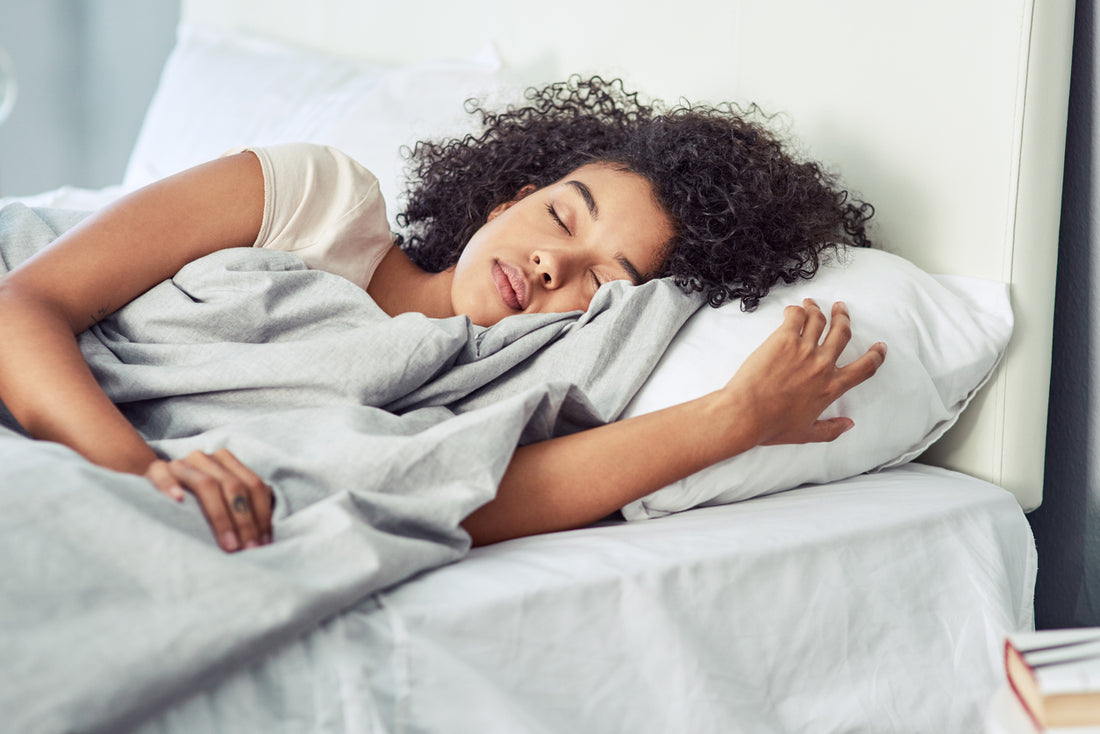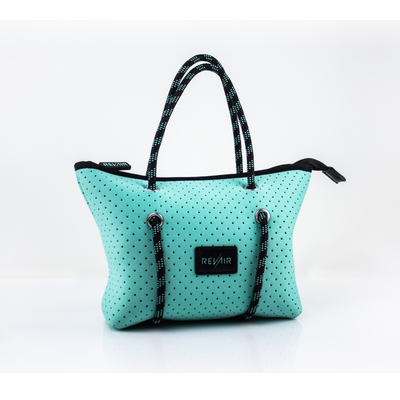
Is Sleeping With Wet Hair Bad for You?

Wet hair, don't care? More like wet hair, beware!
Sleeping with damp locks can seriously damage your hair. Bedhead isn't simply an inconvenience. Frizz, flyaways, and "crazy hair" are all telltale signs of hair damage. We know hopping from the shower straight to your warm bed is tempting. However, read on and consider the following reasons why sleep and wet hair don't mix.
WHY WET HAIR WEIGHS DOWN YOUR STYLE
"Handle with care" is a mantra many hair gurus have learned to apply when working with wet hair. Shower-fresh locks are fragile and prone to breakage, which means that it's important to look after your hair when it's wet. Special caution should be taken when brushing, styling, and even when sleeping. No hair type is immune to the science of frizz! Fine, delicate hair types, however, should be especially careful and should avoid sleeping with wet hair to minimize hair loss and breakage.
Protein-to-protein bonds are inherently stronger in dry hair; water proteins form weakened hydrogen bonds when the hair is wet. This can leave hair prone to damage, such as frizz, shedding, and dullness. In addition, water strips away the hair's natural moisture as it dries, leaving the hair stiff and brittle. When caring for wet hair, nurturing natural elasticity is the goal.
Let's take a closer look at the effects of sleep with wet hair.
FRICTION AND FRIZZ
Wet hair should be treated with care. Of course, this can be challenging to do when you're asleep. Tossing and turning increases tension on your locks. This can lead to hair loss, breakage, and frizz. If you've ever woken up to strands of hair on your pillowcase, you'll understand the toll sleep can take on your hair. Even worse, wet hair adheres to its shape more quickly than dry. That means your wild bedhead will easily stick around until morning, complete with frizz and flyaways.
Sleeping with wet hair pulls on weak spots, causing tangles and other hair woes. Simply put: Sleep and wet hair are a stressful combination.
HYDRATE OVERNIGHT
If you sleep on a cotton pillowcase, chances are your wet hair is being stripped of its moisture every night. Rough, porous surfaces absorb moisture. Pillowcases - and even sheets - are among the worst culprits. Trade in those cotton or linen pillowcases for non-static silk pillowcases to protect your hair while you sleep. Silk pillowcases prevent your hair from sticking to the pillow, ultimately reducing overnight breakage and frizz.
"Since the hair shaft's protective layer is fluffed up, this allows moisture and nutrients to escape," says Eva, a beauty blogger. "Dehydrated and depleted hair loses the shine and vitality that healthy hair needs to thrive."
Get your glow back by minimizing the number of nights you go to sleep with wet hair.
CHILLS, HEADACHES, AND MIGRAINES - OH MY!
Falling asleep with a chill is never a good idea. Even on warm summer nights, the temperature can shift drastically; adding a chill can lower your immune system. Think of it as going to bed with wet socks.
"Cold temperatures also cause blood vessels to constrict," state healthcare professionals.
"When this happens, your respiratory tract gets fewer white blood cells that it needs to ward off respiratory infections like influenza and bacterial pneumonia."
Sleeping with wet hair can also cause you to wake up with a headache - or worse, a migraine. This phenomenon is essentially a type of "brain freeze." Imagine eating ice cream too quickly and feeling the blood vessels in your brain contract. Now imagine keeping that same pressure on your head all night. Cold exposure can cause cranial, neck, and even shoulder pain. This is often enough to trigger a headache or jumpstart a migraine. Ouch!

BACTERIA, DANDRUFF, AND OTHER WOES
Bacteria thrive in warm, damp environments, such as in your pillow and on your scalp when you go to sleep with wet hair. This provides the ideal environment for bacterial growth. In turn, this can lead to build-up, inflammation, and redness. If you've been waking up with an itchy scalp, your nightly hair care routine might be the culprit.
Fungi can cause conditions like dermatitis and dandruff, leading to discomfort that can seriously ruin your hair day. Unfortunately, changing your sheets and pillowcases every day won't help when water is involved. To combat bacterial and fungal infections, the optimal treatment is to stop these issues at their source. That means providing a healthy, dry environment for your hair and scalp.
BREAKAGE AND HAIR LOSS
Did you know that going to bed with wet hair may cause hair loss, thinning, and breakage? Wet hair is twice as likely to break, fray, and split. All hair types suffer from the weight of water and product residue that contributes to breakage. However, those with fine, delicate hair should be especially careful when going to sleep with wet hair.
Fuller, curly hair types also need to be mindful of this practice. A poor nightly hair care routine can ruin natural hair growth if you're trying to grow and stretch your curls. You might also find that your curls look a bit "shrunk" in the morning and aren't displaying their usual full, radiant volume. You might also see lots of shedding and hair on the pillowcase, comb, or bathroom floor. Taking a break from sleeping with wet hair can dramatically decrease hair loss and lead to longer, healthier locks.
In addition, drying your hair before bedtime lessens dullness and restores your hair's natural luminosity and shine. That's the kind of beauty rest we love to see as healthy hair fanatics!
HOW TO MINIMIZE DAMAGE FROM SLEEPING WITH WET HAIR
Now that we've discussed why sleeping with wet hair is a big nope for the healthy hair community, we need to acknowledge one very simple truth: life gets busy. Sometimes we're running back from work and setting our alarm for the next morning, all while hopping in the shower for a quick refresh. We understand there may be times when falling asleep with wet hair happens. Rather than aiming for perfection, we've put together a short list of healthy hair tips that can minimize the damage to wet hair.
1. CHANGE UP YOUR BEDDING
Static-resistant bedding that is quick drying and non-absorbent will help seal moisture into your ends. As mentioned above, try some silk pillowcases to reduce friction and breakage, or make it a habit to wrap your hair before bed in a bonnet or scarf. It's important to note, however, that towels are NOT bonnets. Going to bed with a towel on your head is a surefire way to cause snares and tangles. A satin scrunchie is a great option for pulling your hair into a loose, messy bun before bed! A waterproof pillowcase is also a great idea, especially if you're someone who frequently sleeps with wet hair. This will prevent bacterial growth and keep you dry and chill-free.
2. DRY YOUR HAIR USING A MICROFIBER TOWEL OR T-SHIRT
Avoid rough bath towels. The terry material that most towels are made with is often very rough and will cause friction to your hair, ultimately causing damage. Dry your hair with a soft tee or microfiber towel to prevent tangles and keep your hair healthy and damage-free.
3. PRE-CONDITION
Add a generous dollop of leave-in conditioner to your hair before bed. This will ensure your hair is still absorbing hydration and nutrients, even while you're asleep.
4. LOCK-IN SHINE
In addition to a deep conditioning treatment, consider adding natural hair oils like jojoba or coconut before bed. This will maintain shine, color, and radiance overnight. Opt for lightweight oils for fine hair, such as rose oil. Heavier coconut oils can be used on curly and wavy hair. Olive oil mixed with shea butter is also a hydrating DIY hair mask for natural curls. When applying these natural oils, start at the ends and work your way toward the roots to ensure full, even coverage.
5. NEVER GO TO BED WITH WET HAIR EXTENSIONS
If you have faux locks, sleeping with wet hair is a hard no. This will cause extensions to tangle and mat, making them virtually unsalvageable. Change your wash day routine and try showering earlier in the evening to ensure that your extensions are fully dry by the time you're ready to sleep.
6. CHANGE YOUR DRYING ROUTINE, NOT YOUR BEDTIME ROUTINE
We often go to bed with wet hair to save time during our nightly shower routine. Rather than saving time by compromising your hair's health and beauty, however, make a change to your daily hair care routine instead.
Drying your hair does not need to be a time-consuming undertaking. Making the switch to a reverse air hair dryer saves you time in your haircare routine. Our revolutionary RevAir dryer gently stretches, dries, and cares for your hair - without the use of high heat. The innovative RevAir design dries hair three times faster than a traditional hair dryer. That way, you can go to bed feeling light, dry, and styled. You'll also feel more refreshed when you wake up.
Your healthy hair should feel as well-rested as you do each morning! That means taking extra care of your lovely locks and prioritizing hair health during your nightly beauty routine. Avoid going to sleep with wet hair whenever possible and keep your hair glowing with the right products and gentle styling tools to help your locks thrive.
Reach out to our team for more healthy hair inspiration and check out how to revive end-of-summer hair. Happy styling!

















